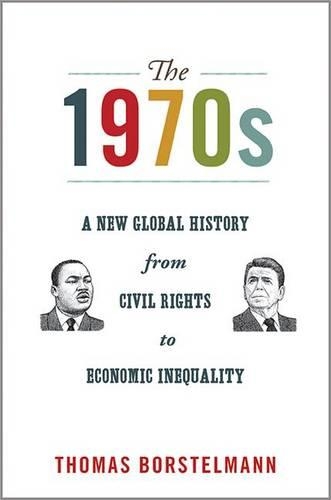
The 1970s: A New Global History from Civil Rights to Economic Inequality
(Paperback)
Publishing Details
The 1970s: A New Global History from Civil Rights to Economic Inequality
By (Author) Thomas Borstelmann
Princeton University Press
Princeton University Press
7th May 2013
United States
Classifications
Tertiary Education
Non Fiction
General and world history
909.827
Physical Properties
Paperback
416
Width 156mm, Height 235mm
567g
Description
The 1970s looks at an iconic decade when the cultural left and economic right came to the fore in American society and the world at large. While many have seen the 1970s as simply a period of failures epitomized by Watergate, inflation, the oil crisis, global unrest, and disillusionment with military efforts in Vietnam, Thomas Borstelmann creates a
Reviews
"Keeping contemporary history timely and accessible, Borstelmann shows the significance of 1970s politics, culture, and religion on the following decades... The author's sterling commentary on the rise of the feminist movement, the decline of the Soviet empire, and the New Christian right's courtship of Capitol Hill sets this book apart from other surveys of the 'Me Decade.' Nuggets of genuine insight without any social agenda are found frequently within these pages."--Publishers Weekly "[T]his is an ambitious and important work that skillfully analyzes all aspects of the seventies and defines its legacy for present times."--Karl Helicher, ForeWord Reviews "What sets this book apart ... is the author's global approach, making clear that by the 1970s, while other countries may not have seen the US as the preeminent world leader it had been, it was very much a part of a world in which, thanks largely to technological advantages, boundaries of time and space and even culture were collapsing. Borstelmann also concisely brings readers to the present, concluding that while Americans have become less racist and sexist and more tolerant of diversity and difference, they have as a nation allowed economic inequality to reach near-epic proportions--in other words, the 1 percent versus the 99 percent."--Choice "Used as a text to enter the field of 1970s U.S. history the book excels and should receive wide readership. The study is accessible, very well written and incorporates much recent 1970s literature... The 1970s is an important addition to the growing body of literature focused on the decade."--Nick Blackboum, 49th Parallel "[I]ntelligent and well crafted."--William L. O'neill, Pacific Historical Review "Thomas Borstelmann provides us with a significant addition to a growing body of literature on the decade. More than an exhaustive survey of American politics, culture, and society in the seventies (a considerable achievement in itself), the study focuses on what Borstelmann brilliantly identifies as the central crux of the decade... Borstelmann has written a thought-provoking, lucid, and at-times brilliant account of American culture, society, and politics in the seventies... [I]f readers approach this book as the capacious and beautifully written history of the United States that it is, they will be richly rewarded."--Natasha Zaretsky, Diplomatic History
Author Bio
Thomas ("Tim") Borstelmann is the Elwood N. and Katherine Thompson Distinguished Professor of Modern World History at the University of Nebraska-Lincoln.
